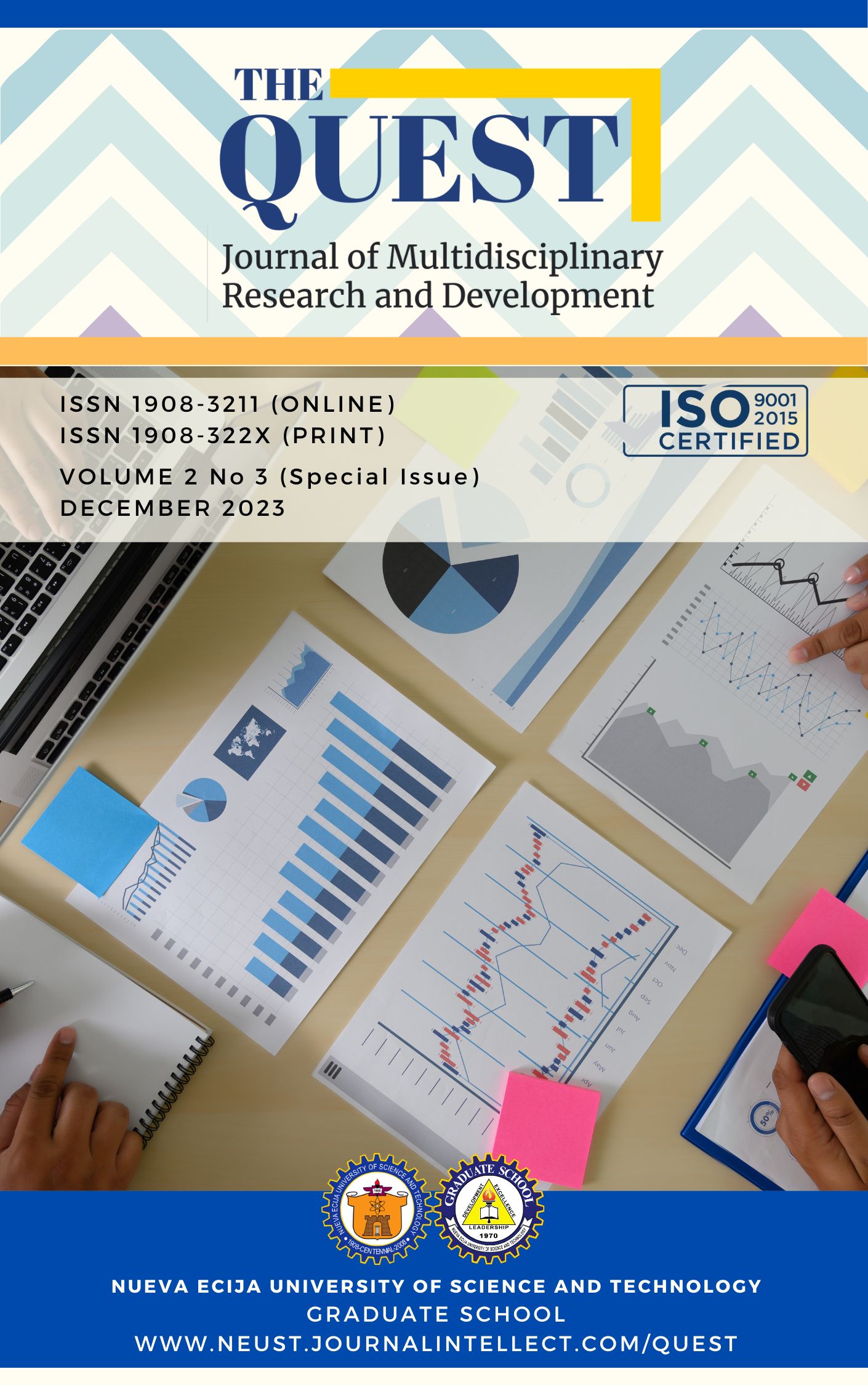Understanding User Engagement Assessment and Modernization in a Chronic Disease Management App on A-B-C Platform

Published 12/30/2023
Keywords
- A-B-C platform,
- Chronic disease management,
- Engagement assessment
How to Cite
Copyright (c) 2023 The QUEST: Journal of Multidisciplinary Research and Development

This work is licensed under a Creative Commons Attribution-NonCommercial 4.0 International License.
Abstract
The study examines user engagement and satisfaction with a chronic disease management app on the A-B-C platform. It explores demographic details and factors influencing engagement, including usability, features, personalization, social support, and accessibility. Specific app elements such as goal-setting, education resources, communication, reminders, and wearables integration are scrutinized, alongside user barriers like technological challenges, awareness gaps, time constraints, and privacy issues. Using a purposive sample of 200 participants, including patients, caregivers, healthcare professionals, and app users, data analysis employs descriptive statistics to inform app modernization efforts. The study demonstrates how usability and robust social support features influence positive user engagement. It also identifies areas for improvement in notifications, educational content, and accessibility. Key app features contributing to satisfaction include personalized goal-setting, comprehensive educational resources, and communication support, while challenges encompass technological barriers, a lack of awareness, time constraints, and privacy concerns. Recommendations include tailored marketing, feature enhancements, and addressing barriers, with proposed plans focusing on user education, data privacy, and app performance. Timely execution of these plans is crucial, with a focus on integrating data privacy measures and security software to ensure a trustworthy user experience.
References
- Albrecht, U. V., Choudhury, T., & Sarker, A. (2017). Toward a privacy-aware mobile health application design: Survey and observations. IEEE Journal of Biomedical and Health Informatics, 21(3), 835–843. https://doi.org/10.1109/JBHI.2016.2596746
- Baker-Eveleth, L., & Stone, D. (2020). Mobile Apps for Chronic Disease Management: A Scoping Review. Digital Health, 6, 2055207620925025.
- Berkman, L. F., et al. (2000). Social Integration and Mortality: A Prospective Study of French Employees of Electricity of France-Gas of France. Epidemiology, 11(4), 416–424.
- Boyle, L., Grainger, R., Hall, R. M., Krebs, J. D., & Goyder, E. (2019). Gamification of active travel to school: A pilot evaluation of the Beat the Street physical activity intervention. Health Promotion Journal of Australia, 30(1), 110–117. https://doi.org/10.1002/hpja.29
- Coulson, N. S., et al. (2007). Receiving Social Support Online: Implications for Health Education. Health Education Research, 22(6), 717–726.
- Deci, E. L., & Ryan, R. M. (2000). The "What" and "Why" of Goal Pursuits: Human Needs and the Self-Determination of Behavior. Psychological Inquiry, 11(4), groups for diabetes: A randomized controlled trial. Health Psychology, 38(5), 391–397. https://doi.org/10.1037/hea0000730
- Hassenzahl, M. (2008). User Experience (UX): Towards an Experiential Perspective on Product Quality. In Proc. 20th Conf. on L'Interaction Homme-Machine (IHM'08), 11–15.
- Hekler, E. B., et al. (2013). Why We Engage in Health Risky Behaviors: Understanding Perceived Benefits and Barriers to Health Behaviors in a College Population. Health Education & Behavior, 40(6), 694–703.
- Huckvale, K., Morrison, C., Ouyang, J., Ghaghda, A., Car, J., & Bonells, C. (2018). The Gamified self-management of hypertension: A user experience pilot study. JMIR Serious Games, 8(4), e20225. https://doi.org/10.2196/20225
